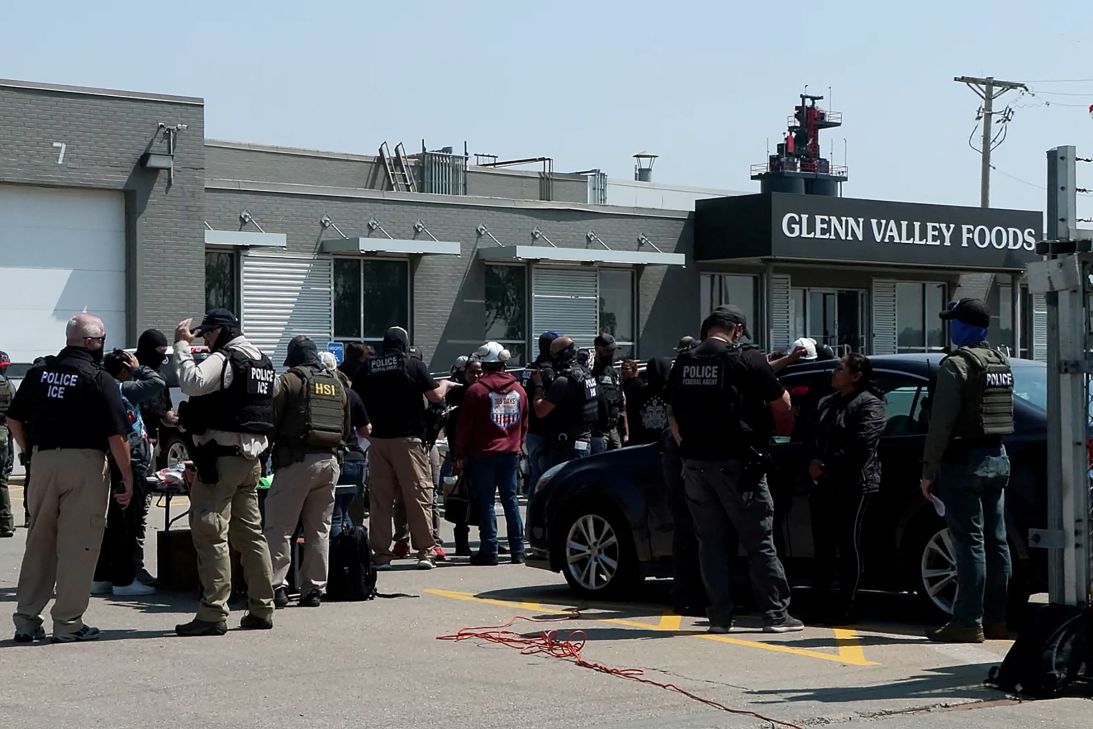Politics
Nebraska’s “Cornhusker Clink” Raises Concerns for Immigrant Families

An undocumented mother living in Nebraska, identified only as Alejandra, has expressed deep concerns about the impact of recent immigration enforcement actions in her community. The opening of a new ICE detention center in McCook, dubbed the “Cornhusker Clink,” is set to hold up to 300 adults and reflects a broader crackdown on undocumented immigrants that has left families living in fear.
Alejandra, a mother of four U.S.-born children, now limits her outings to essential trips only, avoiding doctor’s appointments and church gatherings. She has prepared her 13-year-old son for the possibility of her detention, equipping him with a list of contacts and his social security number. “I cannot be separated from my kids,” she stated, emphasizing the emotional toll of the current climate.
The recent surge in ICE raids, exemplified by a significant operation at a meatpacking plant in Omaha, has unsettled the local immigrant community. This raid was described by ICE as the largest worksite operation in Nebraska since the beginning of the Trump administration. Several acquaintances of Alejandra were among those detained, amplifying her anxiety about her family’s safety.
Expansion of Detention Facilities in Nebraska
The impending launch of the Cornhusker Clink adds to a series of newly established ICE detention centers across the United States, with similar facilities named for their regional characteristics in Republican-led states. According to a spokesperson for Nebraska’s Republican Governor Jim Pillen, the contract with the Department of Homeland Security (DHS) is anticipated to generate approximately $14 million annually for the state.
Pillen has actively supported federal immigration policies, recently signing an executive order to bolster immigration enforcement. His administration’s measures include deploying the Nebraska National Guard to Texas and facilitating troop activations in response to local ICE protests. While these actions are framed as efforts to protect Americans from criminal activity, critics argue that they threaten the stability of Nebraska’s immigrant workforce.
The Economic Impact of Immigration Raids
Nebraska’s economy relies heavily on its immigrant population, particularly within the meatpacking industry, which includes major employers like JBS, Tyson Foods, Cargill, and Smithfield. According to the Migration Policy Institute, undocumented immigrants represent approximately 53% of the state’s workforce. Yet, increased deportation fears have created an atmosphere of intimidation, leading many workers to hesitate about reporting to their jobs.
The state’s labor market currently faces a significant shortfall, with only 70 available workers for every 100 open jobs, as reported by the U.S. Chamber of Commerce. Immigration advocates argue that rather than taking jobs from Americans, immigrants have been filling critical labor shortages that have persisted for decades.
John Hansen, president of the Nebraska Farmers Union, noted the growing fear among workers, many of whom regret their support for Trump’s policies. These sentiments highlight a disconnect between the political narrative and the reality of immigrant contributions to the state’s economy.
The Cornhusker Clink, formerly a state prison focused on reintegration services, has raised alarms among civil rights advocates. Mindy Chipman, executive director of the American Civil Liberties Union of Nebraska, criticized the repurposing of the facility, stating it undermines support services for low-risk offenders and shifts focus away from rehabilitation.
As the facility prepares to open, it is crucial to consider the logistics for families and legal representatives. The remote location of McCook complicates access for those seeking to support detained individuals. Travel to the center requires a car, which can be particularly challenging during Nebraska’s harsh winters.
For Alejandra and her family, the changing atmosphere in Nebraska is palpable. Once a welcoming community where diversity flourished, she now fears for her safety and the future of her children. Her parents, who also face the threat of deportation, are contemplating returning to Mexico due to safety concerns and the stress of living under the shadow of immigration enforcement.
As the Cornhusker Clink opens, the implications for families like Alejandra’s extend beyond immediate fears. They reflect broader tensions in the national immigration debate and the evolving identity of Nebraska as a state. The choices faced by Alejandra and countless others highlight the urgent need for a compassionate approach to immigration that recognizes the contributions and humanity of all residents, regardless of their immigration status.
-

 Sports2 weeks ago
Sports2 weeks agoSteve Kerr Supports Jonathan Kuminga After Ejection in Preseason Game
-

 Top Stories7 days ago
Top Stories7 days agoMarc Buoniconti’s Legacy: 40 Years Later, Lives Transformed
-

 Science3 weeks ago
Science3 weeks agoChicago’s Viral ‘Rat Hole’ Likely Created by Squirrel, Study Reveals
-

 Politics3 weeks ago
Politics3 weeks agoDallin H. Oaks Assumes Leadership of Latter-day Saints Church
-

 Business2 weeks ago
Business2 weeks agoTyler Technologies Set to Reveal Q3 2025 Earnings on October 22
-

 Lifestyle2 weeks ago
Lifestyle2 weeks agoKelsea Ballerini Launches ‘Burn the Baggage’ Candle with Ranger Station
-

 Lifestyle2 weeks ago
Lifestyle2 weeks agoDua Lipa Celebrates Passing GCSE Spanish During World Tour
-

 Entertainment3 weeks ago
Entertainment3 weeks agoZoe Saldana Advocates for James Cameron’s Avatar Documentary
-

 Business3 weeks ago
Business3 weeks agoMLB Qualifying Offer Jumps to $22.02 Million for 2024
-

 Sports2 weeks ago
Sports2 weeks agoPatriots Dominate Picks as Raiders Fall in Season Opener
-

 Health2 weeks ago
Health2 weeks agoRichard Feldman Urges Ban on Menthol in Cigarettes and Vapes
-

 Health2 weeks ago
Health2 weeks agoCommunity Unites for Seventh Annual Mental Health Awareness Walk









